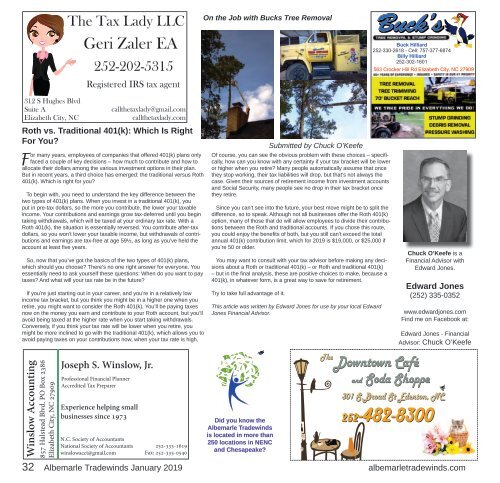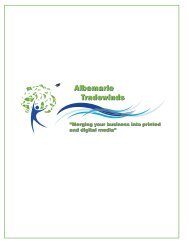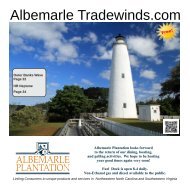Tradewinds Jan 2019 Web OPT
Create successful ePaper yourself
Turn your PDF publications into a flip-book with our unique Google optimized e-Paper software.
The Tax Lady LLC<br />
Geri Zaler EA<br />
252-202-5315<br />
Registered IRS tax agent<br />
On the Job with Bucks Tree Removal<br />
Buck Hilliard<br />
252-330-2618 - Cell: 757-377-6874<br />
Billy Hilliard<br />
252-302-1601<br />
563 Crocker Hill Rd Elizabeth City, NC 27909<br />
312 S Hughes Blvd<br />
Suite A<br />
Elizabeth City, NC<br />
callthetaxlady@gmail.com<br />
callthetaxlady.com<br />
Roth vs. Traditional 401(k): Which Is Right<br />
For You?<br />
For many years, employees of companies that offered 401(k) plans only<br />
faced a couple of key decisions – how much to contribute and how to<br />
allocate their dollars among the various investment options in their plan.<br />
But in recent years, a third choice has emerged: the traditional versus Roth<br />
401(k). Which is right for you?<br />
To begin with, you need to understand the key difference between the<br />
two types of 401(k) plans. When you invest in a traditional 401(k), you<br />
put in pre-tax dollars, so the more you contribute, the lower your taxable<br />
income. Your contributions and earnings grow tax-deferred until you begin<br />
taking withdrawals, which will be taxed at your ordinary tax rate. With a<br />
Roth 401(k), the situation is essentially reversed. You contribute after-tax<br />
dollars, so you won’t lower your taxable income, but withdrawals of contributions<br />
and earnings are tax-free at age 59½, as long as you’ve held the<br />
account at least five years.<br />
So, now that you’ve got the basics of the two types of 401(k) plans,<br />
which should you choose? There’s no one right answer for everyone. You<br />
essentially need to ask yourself these questions: When do you want to pay<br />
taxes? And what will your tax rate be in the future?<br />
If you’re just starting out in your career, and you’re in a relatively low<br />
income tax bracket, but you think you might be in a higher one when you<br />
retire, you might want to consider the Roth 401(k). You’ll be paying taxes<br />
now on the money you earn and contribute to your Roth account, but you’ll<br />
avoid being taxed at the higher rate when you start taking withdrawals.<br />
Conversely, if you think your tax rate will be lower when you retire, you<br />
might be more inclined to go with the traditional 401(k), which allows you to<br />
avoid paying taxes on your contributions now, when your tax rate is high.<br />
Winslow Accounting<br />
857 Halstead Blvd. PO Box 2386<br />
Elizabeth City, NC 27909<br />
Joseph S. Winslow, Jr.<br />
Professional Financial Planner<br />
Accredited Tax Preparer<br />
Experience helping small<br />
businesses since 1973<br />
N.C. Society of Accountants<br />
National Society of Accountants<br />
winslowacct@gmail.com<br />
252-335-1619<br />
Fax: 252-335-0540<br />
Did you know the<br />
Albemarle <strong>Tradewinds</strong><br />
is located in more than<br />
250 locations in NENC<br />
and Chesapeake?<br />
Submitted by Chuck O’Keefe<br />
Of course, you can see the obvious problem with these choices – specifically,<br />
how can you know with any certainty if your tax bracket will be lower<br />
or higher when you retire? Many people automatically assume that once<br />
they stop working, their tax liabilities will drop, but that’s not always the<br />
case. Given their sources of retirement income from investment accounts<br />
and Social Security, many people see no drop in their tax bracket once<br />
they retire.<br />
Since you can’t see into the future, your best move might be to split the<br />
difference, so to speak. Although not all businesses offer the Roth 401(k)<br />
option, many of those that do will allow employees to divide their contributions<br />
between the Roth and traditional accounts. If you chose this route,<br />
you could enjoy the benefits of both, but you still can’t exceed the total<br />
annual 401(k) contribution limit, which for <strong>2019</strong> is $19,000, or $25,000 if<br />
you’re 50 or older.<br />
You may want to consult with your tax advisor before making any decisions<br />
about a Roth or traditional 401(k) – or Roth and traditional 401(k)<br />
– but in the final analysis, these are positive choices to make, because a<br />
401(k), in whatever form, is a great way to save for retirement.<br />
Try to take full advantage of it.<br />
This article was written by Edward Jones for use by your local Edward<br />
Jones Financial Advisor.<br />
The Downtown Café<br />
and Soda Shoppe<br />
Chuck O’Keefe is a<br />
Financial Advisor with<br />
Edward Jones.<br />
Edward Jones<br />
(252) 335-0352<br />
www.edwardjones.com<br />
Find me on Facebook at:<br />
Edward Jones - Financial<br />
Advisor: Chuck O’Keefe<br />
301 S.Broad St Edenton, NC<br />
252-482-8300<br />
32 Albemarle <strong>Tradewinds</strong> <strong>Jan</strong>uary <strong>2019</strong> albemarletradewinds.com

















